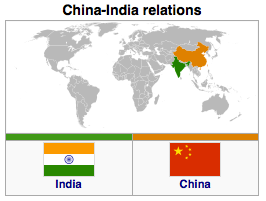Chinese Expert Foresees Bigger Roles For India And China In Af-Pak Post 2014
By Observer Research Foundation
By Sadhavi Chauhan
Regional integration and cooperation will play a crucial role in shaping the situation in Af-Pak after 2014, according to Dr. Zhang Jiadong, Assistant Director of the Centre for American Studies, Fudan University.
Speaking during a discussion on ’The Af-Pak Region after 2014: China’s Interests and Concerns’ organised by Observer Research Foundation on August 31, 2012, Dr. Jiadong emphasised on USA’s role in the region post 2014. According to him, the three main factors that will shape the future of Af-Pak are: the scale of US military presence in the region, the monetary contribution of the international community to the region and the US government’s policy towards non-military factors like the Taliban.

These factors, he said, were directly connected to the domestic vulnerabilities of Afghanistan. Politically, the country is suffering due to the continued differences between the Taliban and its political leaders. Economically, its performance has been poor, leaving many people unemployed. This in turn has pushed many people towards militant activities, adversely affecting the regional security.
Any attempt to improve the security would require a combination of international and domestic efforts. Internationally, the US and other regional countries will be required to increase their military presence, and domestically, the Afghan National Army and the police will have to improve their capacity.
Dr. Jiadong said that although he was not very optimistic about the situation of Af-Pak post 2014, at the same time, he was not completely pessimistic either. He noted that the US army’s role in ensuring regional security has become negligible today. Therefore, even after the forces withdraw in 2014, the change in the security situation should be minimal.
Prof. Li Jian, Vice President of the China West Normal University, gave a historical perspective on the region. He said the Af-Pak problem is a gift of the region’s colonial past and it is these colonial powers which should take responsibility for the situation in the region today. He said the main vulnerability of Af-Pak, namely the cross border ethnic differences, was sowed by the imperial powers that arbitrarily drew the borderlines without considering the ethnic elements. Currently, this age old problem has no permanent solution. The only thing that can be done is to wait and watch it unfolds.
The second fragile element in Af-Pak relations, according to Prof. Li Jian, is the complex domestic circumstances in both these countries. He said both have inefficient management systems and tough economic situations. Unless, these are improved, development of Af-Pak will be unlikely. He said although world powers, including the US, have done a lot to rebuild Afghanistan, these efforts have not been enough. There is a need for these world powers to look beyond the historical burden and work together for cooperation in the region.
Dr. Shen Xiaochen, from the Lanzhou University, analysed the ongoing economic policies in the region. He described the American “New Silk Route” strategy as the best economic framework to address Af-Pak’s problems. He, in particular, lauded the strategy for promoting regional trade and transportation in Af-Pak, which in turn is fostering regional cooperation.
Highlighting the role of India, he said India will play a central role in shaping the Af-Pak situation post 2014. Not only is it the fifth biggest contributor to Afghanistan but also has cultural linkages to the region. He said India, Afghanistan and the US share a similar strategic vision towards this region and so a trilateral partnership between these three should be closely followed. Dr. Xiaochen concluded by saying that the region requires practical cooperation. It is crucial to realise that some negatives will always be followed with some positive development. Thus, while the US will withdraw from Afghanistan, simultaneously a larger role will be carved out for the regional players, namely India and China. Regional cooperation will be crucial for the development of Af-Pak and countries like India and China should assume more responsible roles, reducing the US to the position of an outside stakeholder.
Dr. C. Raja Mohan, Distinguished Fellow at ORF, highlighted the confluence of Indian and Chinese interests in the region. He said the issue of Af-Pak was closely integrated to the interests of both these Asian powers. An unstable Afghanistan will dramatically destabilise the region. A solution to this crisis cannot be found in the historical blame game. The region has undergone a major change both in the level of conflict and nature of violence. Irrespective of what the US does and the current policies of its government, there is a need for India and China to accept responsibility for the future of the region. The two countries need to understand each other’s positions rather than make efforts to influence each other’s opinion.
(This report is prepared by Sadhavi Chauhan, Associate Fellow, Observer Research Foundation, New Delhi)

Pakistan is not that problemetic as Afghanistan.Durrand line between them is not recognised by even Taliban.With ISI backed haqqani group is being branded just now in 2012 as terrorist group, the uSA is showing its annoyance towards the ruling class of Pakistan which it supoorted throughout its history. It is the strategic defiance of Pakistan with ref to USA which will be the corner stone of post 2014 Afghanistan